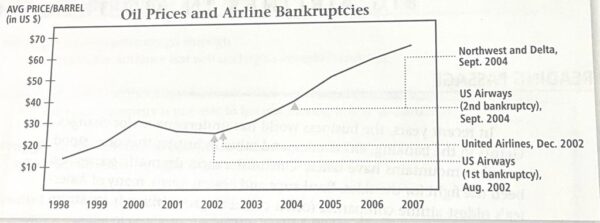This page is designed for English as a second language (ESL). Our school is the Bogotá Language Lab, and is the «Business English» and «Academic» branch of Legal English Innovation SAS.
Contact us for private coaching today! We can help you.
What is more important: Price, Quality, or Safety
In recent years, the business world has undergone major changes. Giants in the banking, electronics, and other industries that once stood as tall as mountains have fallen. One of the most dramatic scenes has been the fight for the skies. Bankrupt and beaten down, many of America’s oldest airline companies (often called «legacy airlines») are struggling to survive.
At one time, a handful of these airlines, including United, Delta, and Northwest, were the kings of the skies. Confident and powerful, they brought in healthy profits as air travel spread.
The late 20th century, however, wasn’t so kind to the legacy airlines. Their management, labor, and cost structures were becoming major burdens. At the same time, several smart, younger companies, like Southwest and JetBlue, stepped onto the stage.
Running an airline is no easy task. Besides buying and maintaining airplanes, renting space at airports, and paying for security, airlines spend a lot of money on fuel and labor. Oil prices have risen sharply since 1998 (see chart).
Meanwhile, legacy airlines have labor costs and pension plans that total billions of dollars per year. Add in the competition from low-cost airlines, and things start to look really bad. Indeed, between 2001 and 2004, U.S. airlines lost a combined $32.3 billion. When losses are that large, companies start to fold.
In 2002, both US Airways and United Airlines went bankrupt. US Airways soon emerged from its debts, but it filed for bankruptcy again in 2004. The following year, with oil at $70 a barrel, Northwest and Delta both declared bankruptcy.
Trying to regain their financial health, the legacy airlines have made a number of moves. Changes include cutting salaries, simplifying the ticket pricing system, and installing «self-check-in» counters at airports. Airlines are also cutting back on the amount of food and drink that passengers are given during flights.
Will these moves be enough to save the big airlines from completely disappearing? Or will one or more of the smaller airlines step up to become the new kings of the sky? In these troubling times, there are no easy answers.
Group Discussion Questions
Practicing conditionals first, second, third …
First Conditional – Real
If you fly for the holidays this year, will you use the self check in counter?
Second Conditional – Hypothetical
If you were an airline CEO, what would you recommend for the industry?
Third Conditional – Real, but never happened
If the directors had been held responsible, would they have acted differently?
Individual Presentation Questions
What was the most interesting part of the article?
What part of the article do you think is common sense?
Name three words that you did not understand.
How would you describe this chart, if you had the opportunity?

The key to making a good introduction is to having all the pieces ready, and then using them in the correct order, but always being flexible to adapt to each situation that you are in.
«Good evening everyone.»
Tip* Never start with «good night» – Good night = good bye
«My name is Eric …»
«Today, we will look at a oil prices and airline bankruptcies, and the key milestones.»
«This will take me a few minutes, so please hold any questions until the end of the presentation.»
«So let’s get the ball rolling!»
«As the title states, we will dive into a decade of airline and oil price relations.»
«For those of you who are not familiar with this chart, the average price per barrel in the US is listed a crossed the left-hand side …»
«and across the bottom we have 1998 to the year 2007 covering a span of about one decade.»
«… And on the right hand side we have the four major bankruptcies in the airline industry …»
«… and let’s get the ball rolling …»
(this is your opportunity to be descriptive, if you feel comfortable with the basics of presenting information)
to mark (verb) – to signal a point when something happens.
ex. Next Wednesday marks the start of our fifth year in business.
a consumer (noun) – someone who buys something.
a rival (noun) – an opponent, competitor.
even (adj.) – at the same level or amount, equal.
disturbing (adj.) – causing a problem or concern.
a trend (noun) – a general direction.
thrilled (adj.) – very excited.
loyalty (noun) – a feeling of duty or faithfulness.
fond (adj.) – pleasant.
The Airline Business
Learn more with our proud partner at Amazon. We work as an affiliate partner to help bring you the best materials to continue learning. shop safe with Amazon.
Opening Lines
“First, let’s take a look at …”
“To get started, let’s take a look at …”
“Let’s get the ball rolling with the first stat …”
Advancing
«Now, I would like to move on to …”
“Then, as you can see, the …”
“In order to keep the ball rolling, I want to …”
Closing Lines
“And finally, if we look at …”
“To wrap up, we can see …”
“Moving onto the final numbers about …”
Competition has never been more intense for admittance into the nation’s top law schools. The application essay represents your only chance to plea your case to admissions officers. Why select you over so many other qualified applicants?
Need help with Word, Excel or Powerpoint?
I Love Books
Click above to find ebooks, audio books and of course print books. We partner with top companies as an affiliate to bring you the best materials.
Let us save you time.
Free Evaluations
Excellent services. Impartial results.
Contact us for free evaluations and testing services. Risk free. Quality guaranteed.


